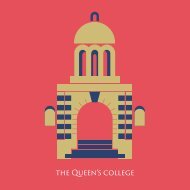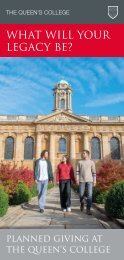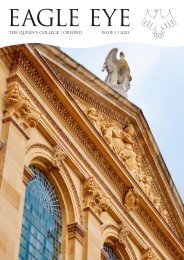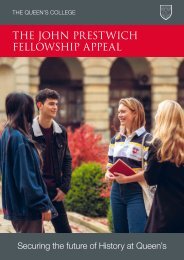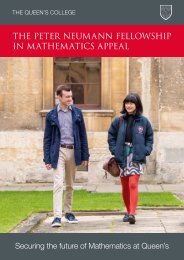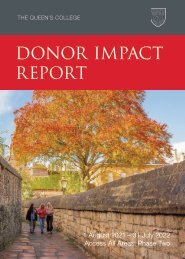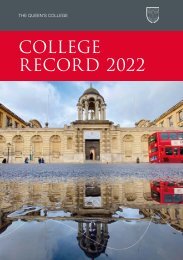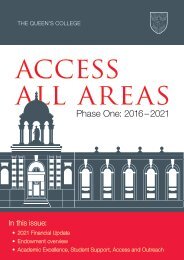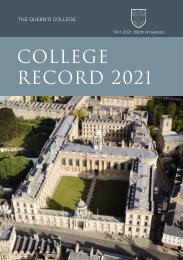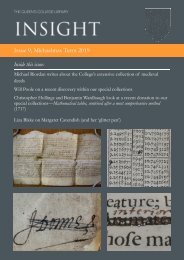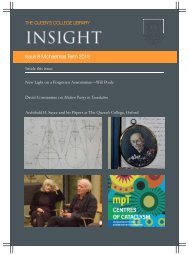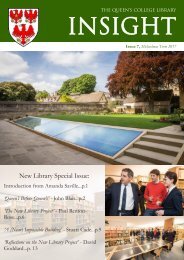The Queen's College Record 2023
Create successful ePaper yourself
Turn your PDF publications into a flip-book with our unique Google optimized e-Paper software.
Obituaries<br />
Gareth left Queen’s for an MPhil at the University of Kent in Canterbury and worked<br />
as a supply teacher for several years. He then became an elected (Labour) councillor,<br />
and housing chair, for Camden council, and subsequently research assistant to Stan<br />
Newens, MEP, in 1990, and a Labour party press officer. He transitioned to freelance<br />
journalist and, in 1992 covered the Kurdish elections in northern Iraq for the Financial<br />
Times. He reported in 1993 on treks in western Iran with Peshmerga guerrillas of the<br />
Kurdistan Democratic Party of Iran, which led to positions of Opinion and Features<br />
Editor of the Daily Star in Beirut and Lebanon correspondent for the FT. In 2003,<br />
while covering the invasion and occupation of Iraq for the FT, he was appointed chief<br />
Iran correspondent, based in Tehran.<br />
Gareth’s independent spirit was never comfortable in an institutional setting,<br />
however, and in 2009, he relocated to Emlagh, on the west coast of Ireland. Here,<br />
he combined freelance journalism with his love of the land, nature, and the seasons.<br />
His study was crammed with books; his garden a testimony to sustainable living.<br />
During his career, he interviewed countless people, from Tony Blair, Martin<br />
McGuiness to Rafiq al-Hariri. In 2005-06, he was nominated as Foreign<br />
Correspondent of the Year in the British Press Awards. More recently, he was<br />
ghostwriter for Saad al-Barrak’s Passion for Adventure (Bloomsbury 2012) and had<br />
been editing and annotating a posthumous book in English of Imam Musa Sadr’s<br />
politico-theological writings.<br />
Deeply influenced by his family’s Republican Irish background, Gareth always refused<br />
to conform to a world increasingly defined by binary views. He believed the training<br />
he received at Queen’s had a profound impact in helping to stay calm in difficult<br />
circumstances. As he would say: once you had defended your essay on Wittgenstein<br />
in front of Brian McGuinness, an exchange with your Chief Editor or an Iranian<br />
Revolutionary Guard held no fears.<br />
His deeply ingrained, natural humanity meant, wherever he was, he immersed himself<br />
in local culture, engaging with people from all walks of life – the barber, the café-owner,<br />
the football player – as well as musicians, writers, and artists. He tried to represent all<br />
views – including, in Tehran, those of the Iran Government. He saw the grey areas,<br />
the nuances often missed, and reported on perspectives that are not commonly<br />
understood. He experienced, first-hand, the horrific and lasting legacy of conflict, and<br />
was with George Bernard Shaw: “War doesn’t determine who is right, but who is left”.<br />
He was much more than a political journalist though. His tastes were wide-ranging:<br />
Bob Marley to Gustav Mahler to Chateau Musar; Myles na gCopaleen to Miles<br />
Davies. He had many interests: cooking with quality, often home-grown, ingredients;<br />
Gaelic and association football; photography; and music, which played from<br />
dawn to midnight in his cottage. He could write about them all with passion and<br />
deep knowledge.<br />
120 <strong>The</strong> Queen’s <strong>College</strong> | <strong>College</strong> <strong>Record</strong> <strong>2023</strong>




